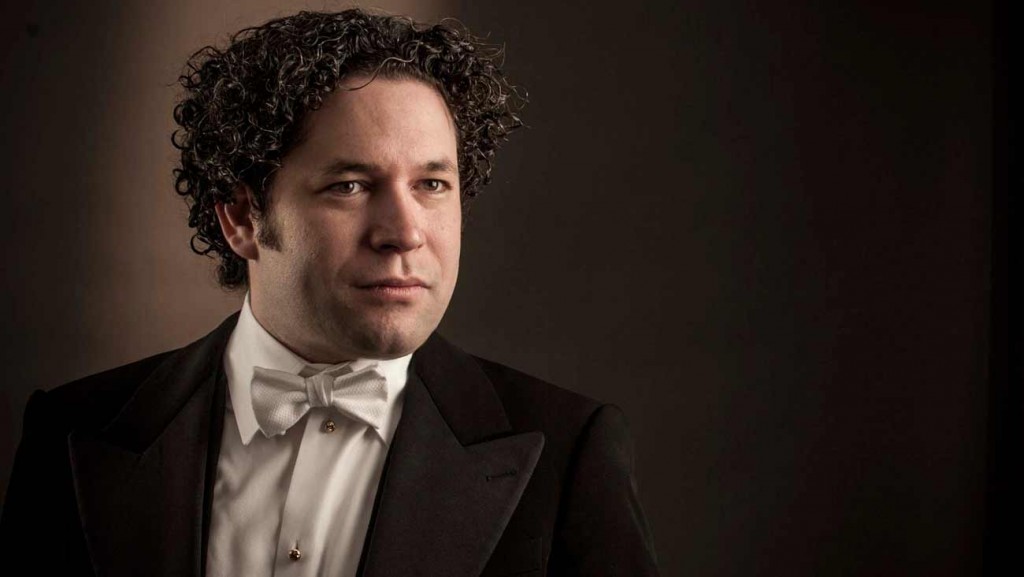Dudamel leads the Los Angeles Philharmonic in a masterful Mahler 3

Gustavo Dudamel led the Los Angeles Philharmonic in Mahler’s Symphony No. 3 Sunday at Carnegie Hall. Photo: Vern Evans
Though primarily committed to its resident institutions, Lincoln Center this year celebrates the fiftieth anniversary of its “Great Performers” series, a set of concerts by visiting presenters that at its best can rival even the season-long offerings at Carnegie Hall.
On Sunday afternoon, patrons of the series were treated to a truly memorable performance by Gustavo Dudamel and the Los Angeles Philharmonic, who gave a mature, intense reading of Mahler’s Symphony No. 3 at David Geffen Hall.
In some ways, this orchestra lacks the polish that we expect of its older cousins–there were questions of intonation across the board, ensemble never felt quite tight enough, and the winds had a raw, aggressive sound that was made only harsher by the acoustic. But whatever the LA Phil might lack in terms of refinement, it more than makes up for in the vigor of its firm, unified playing. All sections of the orchestra worked together to produce one intricate, beautifully woven texture—even the percussion seemed to be folded immaculately into an immense tapestry of sound.
This was evident from the very start of the first movement–a hair-raising beginning, born out of an imposing brass fanfare. The strings played with fiery conviction, creating a heavy pall as the brass struggle heroically to break through. These dominating minor sections presented a chill wind, contrasted nicely by the crisp, even, sprightly march. The last instance of the march in particular was a playful jest, growing out of a whisper and ultimately culminating in triumphant, flag-waving bombast.
A graceful, free menuet began with a lovely solo introduction by principal oboe Ariana Ghez, and given the opportunity, the strings here swelled into a shining golden warmth. The easy, swinging theme of the third movement, evolving finally into pulsing energy in its closing bars, was punctuated lovingly by an angelic flügelhorn solo. Nearly halfway through the hundred-minute symphony, the energy of the performance still seemed as fresh as it had in the opening bars, never once flagging in Dudamel’s masterfully paced reading.
The mezzo-soprano for Sunday’s performance was Tamara Mumford, whose dark voice lent natural weight to her solo in the fourth movement; yet there was a radiant calm to her singing, as she sat just above the brushing whispers of the orchestra with her plaintive cries of “O mensch.”
She sang with a smoldering focus in the following movement, providing a stark contrast to the bright clarity of the cries of “Bimm! Bamm!” from the Brooklyn Youth Chorus. There was a surprising roughness to the singing by the women of the Concert Chorale of New York, yet it did not at all hamper the joyous bounce of their singing and the orchestra’s playing.
It’s hard to pick out the most famous section of this work, but an easy contender is the primary melody of the finale, its warm strains cooing out a line notably reminiscent of the standard “I’ll be seeing you.” Despite that association, there was no saccharine crooning in Dudamel’s rendition; the playing here was reverent and loving, not oversold in the slightest, even as it modulated into a minor key and the strings showed more bristle than anywhere else in the symphony. The beaming, glorious resolution earned a deafening ovation, particularly for the orchestra’s soloists, who each received generous roars as they were introduced.
* * *
In multiple symphonies Mahler calls for a pause between movements; in this one, the break comes just after the first movement, dividing the symphony into two distinct sections. Just once, it would be nice to experience this pause in the concert hall uninterrupted by a tromping stream of latecomers; for all their cries of “no late seating,” ushers always seem all too ready to admit ticket-holders in the middle of a piece.
Until house managers change their policies, we will be forever doomed to watch confused stragglers clamber over their fellow listeners during the opening bars of the second movement of a symphony or concerto. With the conductor and players working so hard to weave a spell over the auditorium, to ruin the moment by throwing open the doors–at a performance on this level, especially–seems almost criminal.
Lincoln Center’s Great Performers series presents the Los Angeles Philharmonic 8 p.m. Monday at David Geffen Hall. The program will include Copland’s Appalachian Spring, Ginastera’s Piano Concerto No. 1 with Sergio Tiempo, and the the New York premieres of John Williams’s Soundings and Andrew Norman’s Play: Level 1. lcgreatperformers.org.
Tea Sets DoMiTea Amber Jewelry Sleeping Bag







Posted Mar 15, 2016 at 10:57 am by Karen Rosales
Well written piece. I was there yesterday and I couldn’t agree more.
Posted Mar 15, 2016 at 4:56 pm by eugene kline
you defined the situation yourself. there are 2 separate and distinct parts and latecomers have every right to be seated between the 1st and 2nd movements. enough time is given by the orchestra to do so. i don’t like it either but i understand it. “no late seating” does not apply at that break. no one should miss the entire concert because of situations beyond his control.